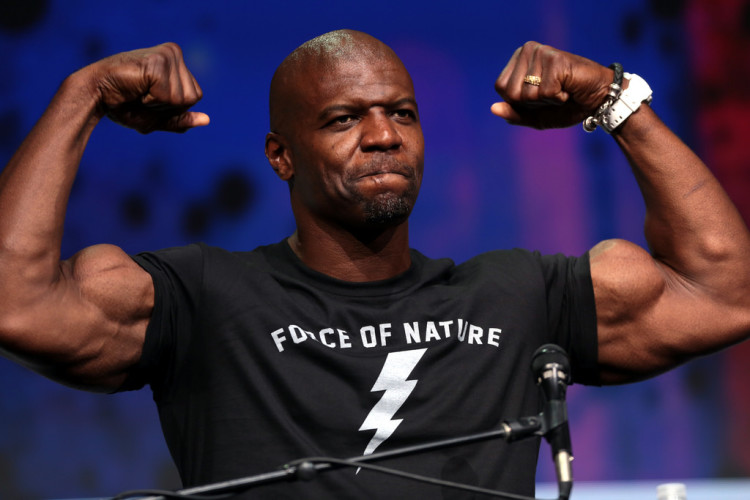The actor, activist and author has become a lighthouse for survivors of sexual violence in a post #MeToo world.
Known for his roles in films such as The Expendables and White Chicks, TV shows Brooklyn Nine-Nine and Everybody Hates Chris and as a former NFL player, Crews’ superstardom is hard to deny. His status and power spanning across several industries paired with his stereotypically ‘masculine’ appearance would lead you to forgive anyone who wouldn’t immediately associate him with the #MeToo movement. But thank the Lord above he is.
Since the #MeToo movement was reignited in Autumn last year, Terry Crews has become a spearhead for creating a much needed social change. As survivors of sexual violence and harassment shared their stories by the millions, he used his voice to take a stand and say “this happened to me, too”. Crews sued Hollywood William Morris Endeavor (WME) agent Adam Venit for allegedly sexually assaulting him at a party in 2016.
“As a man, I was taught my entire life that I must control the world.”
Yesterday, June 26th, Mr Crews spoke before the Senate Judiciary Committee about proposed legislation The Sexual Assault Survivors’ Bill of Rights, speaking candidly about his own experience to advocate for the rights of other survivors.
Crews also reflected on his childhood and the universal culture of toxic masculinity – something he admitted to once inputting towards subconsciously, and now fiercely campaigns against.
As a child I watched as my father violently abused my mother, using his power and authority to dominate her. As I grew up, this thought transformed the type of man I became. I swore I would never be like my father and yet I believed, to my core, that as a man, I was more valuable in this world. As a protector and symbol of strength, I was more worthy. As a man, I was taught my entire life that I must control the world. So, I used power, influence and control to dominate every situation.
“As I shared my story, I was told over and over that this was not abuse.”
Speaking of sharing his story and fighting for the rights of other survivors, he said:
Then, in 2016 while at a party with my wife, I was sexually assaulted by a successful Hollywood agent. The assault lasted only minutes, but what he was effectively telling me while he held my genitals in his hand was that he held the power. That he was in control.
This is how toxic masculinity permeates culture. As I shared my story, I was told over and over that this was not abuse. This was just a joke. This was just horseplay. But I can say one man’s horseplay is another man’s humiliation. And I chose to tell my story and share my experience to stand in solidarity with millions of other survivors around the world.
There’s no denying that Terry Crews’ involvement with the #MeToo movement is a special, powerful thing. Of course, any survivor or ally using their voice to speak up against injustice and toxic masculinity is powerful. But when that voice comes from someone who many would, by one mistaken assumption or another, disassociate from such a campaign, it renders true just how widespread an epidemic sexual violence and toxic masculinity is. It provides hope then that other men may choose disclose their personal experiences with sexual violence, or decide to speak against the culture of toxic masculinity that encourages them to act or not act in certain ways.
But, this said, there’s still much to be done. Already, the social media monster has reared its ugly head. “Why didn’t he fight back against his assailant?” “What else are his muscles useful for?” “A man, a victim of sexual assault? How hilarious!” Not only from members of the public, but from other big name stars – rapper 50 cent proceeded to mock Crews’ experience with a tiring meme on Instagram.
When asked why he decided not to react with violence or aggression in the immediate aftermath of the assault, Crews said:
As a black man in America, you only have a few shots at success, you only have a few chances to make yourself a viable member of the community. I’m from Flint, Michigan. I have seen many young black men who were provoked into violence: They were in prison or they were killed. They’re not here.
The fact is, we all react to these things differently. In honesty, we don’t know how we’d react to experiencing sexual violence until we experience sexual violence. And while much stigma still exists around what it’s like for a man to have to experience such a thing, it’s comforting to see someone like Mr Crews using his voice to break down that stigma.
All that’s left to say is thank goodness for Terry Crews. Thank goodness for him using his platform to stand up for survivors of sexual violence. Thanks goodness for him fighting for a true culture shift and dismantling myths and misconceptions. Thank goodness for him using his status to perforate into the realms of people who otherwise may not have much to say about toxic masculinity, or know about its existence at all.
Watch the full powerful speech here:
Let’s stay connected – sign up to receive campaign news and updates, including upcoming events, new blogs and podcasts, and ways you can get involved in ending domestic abuse and sexual violence.




